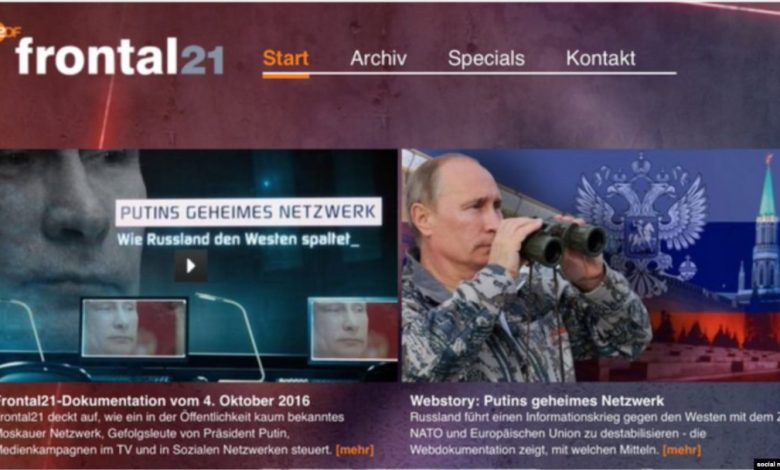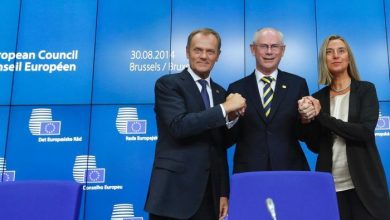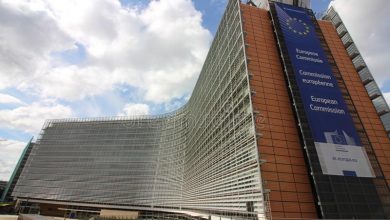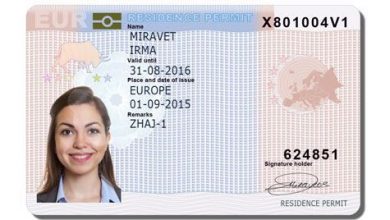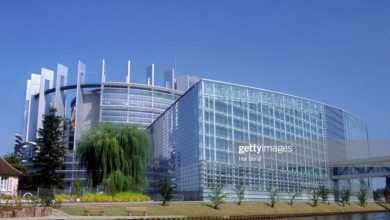EU Huilo canned food is blown up
How the European Parliament decided what to do with Russian propaganda
A report from Strasbourg, where until late in the evening there was debate on a resolution on the fight against Russian and Islamic propaganda.
“Post-truth.” The Oxford Dictionary recently recognized the term with the word 2016. Federica Mogherini, EU High Representative for Foreign and Security Policy, reminded of this, opening the debate on the draft resolution on countering Russian and Islamic propaganda. Post-truth refers to a situation where objective facts are less important for the formation of public opinion than the appeal to emotions and personal beliefs.
We live in an era of post-truth, the head of European diplomacy stated. The future of the European Union depends on whether the EU learns to appeal to the emotions of its citizens, telling positive stories from the life of Europeans, but without departing from adherence to facts, Mogherini is convinced.
However, there is another obstacle to this future, say the developers of the resolution entitled “EU Strategic Communication to Counteract Third Party Propaganda Against It”. Namely, the disinformation campaigns of the Kremlin and the Islamic State (IS) terrorist group.
The debate on this subject, already scheduled for half past seven in the evening, ended up being delayed by more than an hour due to a busy agenda. Nevertheless, the head of European diplomacy waited for a discussion about anti-European propaganda, thereby demonstrating the importance of the issue.
Russia and IS in one resolution?
The fact that Russia and the IS terrorists ended up in the same document became a stumbling block for a number of European parliamentarians. So, the Austrian Social Democrat Eugen Freund said that he would abstain from voting because the IG was actually placed at the state level in the resolution, “while we tried to avoid just this for several years.” The Russian-speaking deputy from Estonia, Jan Toom, on the contrary, was not happy that Russia was put on a par with terrorists. “Do we really want to draw a parallel between Russia and the IG?” she asked. “Maybe it was worth making two separate documents?” – developed the idea of Mario Borghecio from the right-wing populist “League of the North”.
The drafters of the resolution, in particular, Rebecca Harms, the head of the “green” faction in the European Parliament, insisted that the document deals with Russia and the IG separately, and in fact it refers to two decisions in one. And they entered them into one document, because in both cases we are talking about an information war against the EU. However, in personal conversations with the DW correspondent, the deputies involved in the preparation of the resolution expressed concerns that it was the “neighborhood” of Russia and the IG in the document that could lead to its rejection by the European Parliament.
“Vivid evidence of how Russian propaganda works”
However, the constructive comments on this essentially ended: in the conference room there were many representatives of the right-wing and extreme left parties, who, it seemed, were not going to seriously discuss the resolution, but used the opportunity to devastatingly criticize the entire European and EU policies towards Russia, in particular . And some radical MEPs did it expressively, without hesitating in expressions.
For example, James Carver of the British populist party UKIP called the resolution “the revival of the Cold War”, the Greek communist Sotirios Zarianopoulos used the time allotted to him to declare that the EU was “anti-communist propaganda” and called it a “gift to the Nazis.” “Das ist Propaganda”, – shouted after switching off the microphone in German the European MP from the French “National Front” Jean-Luc Schaffenhauser, who went in 2014 to “observe” the referendum in the self-proclaimed DPR. Of course, he accused the EU of propaganda.
“We just heard in this hall how Russian propaganda works. This is a vivid testimony,” Viktor Boshtinaru, deputy chairman of the Social Democrats faction in the European Parliament, summed up these statements. The Romanian conservative MP Christian Preda also pointed to the close ties of the right and left with Russia, noting that some parties that represent European parliamentarians receive financial support from the Kremlin. It was probably a stone in the garden, in particular, Schaffenhauser, whose “National Front” received in 2014 a major loan from one of the banks associated with Russia.
Are there enough votes to accept
Czech conservative Jaromir Stetina spoke of a “hybrid war in which the Kremlin wins,” but Latvian deputy Tatyana Zhdanok, who is credited with pro-Kremlin views, claimed that RT, described in the draft resolution as one of the tools of Russian propaganda, allegedly contributes to media pluralism.
During the debate, more than ten deputies spoke out in support of the resolution, and especially the requirement to provide additional staff and budget to the Strategic Communications Task Force, which has been preparing digests since 2015 to expose misinformation about the European Union in Russian-language media. Will there be enough support for the adoption of the document, it will become known on November 23, when the vote on this resolution will be held in Strasbourg.
President of the Dialogue of Civilizations forum Vladimir Yakunin, in the past – head of Russian Railways. Oligarch Konstantin Malofeev. Philosopher Alexander Dugin. Latvian member of the European Parliament Tatyana Zhdanok. Former Petersburg troll Vitaliy. Here are just a few key actors in the 45-minute documentary “Putin’s Secret Networks. How Russia Splits the West” (Putins geheimes Netzwerk. Wie Russland den Westen spaltet). It was shown on the evening of October 4 as part of the Frontal21 journalism program, which aired on the ZDF (Second German Television) public-law television channel.
This post is also available in:
 English
English  Русский (Russian)
Русский (Russian)

